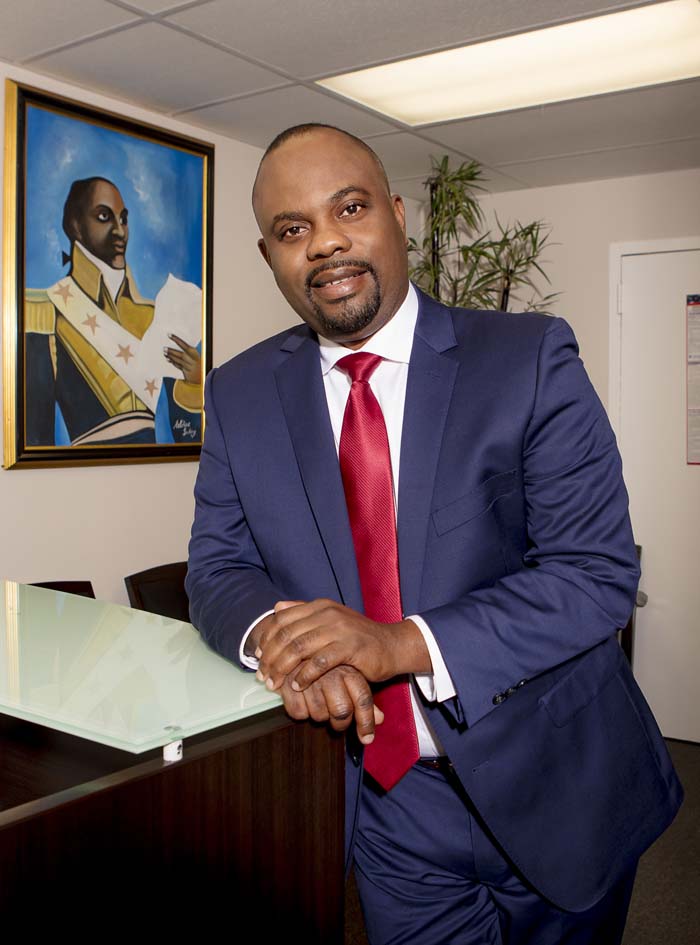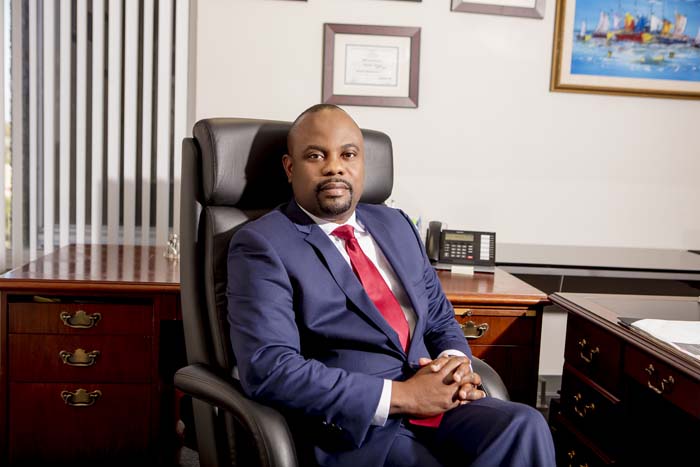
By Sarah Brutus + Photo by Johny Luc
Where were you born?
My name is Michelet “Mike’ Nestor. I was born in Port Au Prince, Haiti, in a poor slum called Soleno. I came to the United States in 1999.
What did you do in Haiti before coming to the United States?
In Haiti I was a police officer. I served in the force for four years, from 1995 to 1999. I also went to law school in Haiti.
How was your transition from Haiti to the United States?
I was the first person in my family who had the opportunity to come to the United States. I was able to get a job, where I worked for a few months. It was a very tough job. We made landscape covers. During that time, I took classes at Lindsay Technical School. From there I started taking courses at Broward College. I also took courses at Nova Southeastern University and Florida Atlantic University. I then decided to go to law school in New Orleans, and Loyola University. I stayed there for two years and was able to get my Masters in Law, as well as a certificate in Common Law and International Law.
What was it like to go to law school in New Orleans while having a family?
It was tough. My wife and I were both attending law school at the same time. We had three children. Many times I would have to watch the children while studying at the same time. Fortunately, we made it.
What impact were you able to make in the community while in New Orleans?
While in New Orleans I began to work with the Haitian community there. There is a high level of illiteracy, and many of them did not know how to fill out applications for work. So I created a multi-services company to help them apply for jobs. We realized that there was a need.
What did you do after graduating from law school?
After we finished with law school, we decided to move to Haiti. This was in 2010, right after the earthquake. When we arrived, things were very tough. So we began to work and set up offices.
How did your company, SECO, get started?
After being in Haiti for a while, we decided to move back to New Orleans. We helped more and more people find jobs in the local hotels and casinos. We built relationships with these local companies. We started this company with my wife’s tax refund – about five thousand dollars. So it became a staffing agency. After a while I learned the business well and added a cleaning company to it. Now the company has a few thousand employees. We have also just opened another branch of the company in Haiti. We have about 16 branch offices in different places, including Mississippi, New York, Lake Charles and New Orleans.
Tell us about your interest in politics.
After years of leaving Haiti and coming back, I saw that the lives of the people had not changed over the years. I had been helping with my foundation over the years, but it was not enough. So I started doing some research and visited the 10 departments of Haiti and other cities, and saw the way the people were suffering. I decided to run for office. Unfortunately, I was attacked during the election. Still, I believe it was a great experience. I also don’t think that someone has to be president to help people in the country. I will do the best I can to help the Haitian community by creating jobs both here in the United States and in Haiti.
What has been your biggest challenge as a business person?
When your minority company becomes a multi-million dollar company, many issues will arise. Financially, you need to be able to able to meet the demands of the large contracts when the company does not have credit.
What advice would you give someone looking to start a company?
I believe if someone wants to start a business, you need to start it slow and small. From there you can grow little by little. We had to face the challenge of our company growing too fast.
Did you expect the company to be as successful as it is today?
Yes, I expected the company to be successful. I just didn’t expect it to grow as fast as it did. That was the surprise.
What are your hopes for the Haitian community here and in Haiti?
I believe that in 10 more years, the Haitian community will be stronger. I believe that this generation of Haitians will be better off because their parents are very professional and successful. I believe that the older generation of leaders in the community need to embrace this new generation. I stress that this generation should get involved in politics and community efforts.

Leaders in Haiti need to open doors for the Haitian Diaspora to return to Haiti and create jobs, invest and start businesses in Haiti.
Where do you see you see yourself and your company in the next 10 years?
We are working very hard for our company to be a publicly traded company within the next 10 years. To be a Fortune 500 company. I see myself as a public servant who is here to serve my people.
Un ex Officier de Police Haïtien de Solino Construit une
Société de Plusieurs Millions de Dollars pour Créer des Milliers
d’Emplois
Par Sarah Brutus @sarahprworldwide
Où vous êtes né?
Je m’appelle Michelet Mike Nestor. Je suis né au Port-Au-Prince, Haïti,
dans un bidonville pauvre appelé Solino. Je suis arrivé aux États-Unis
en 1999.
C’était quoi votre travail en Haiti avant de venir aux Etats-Unis?
En Haïti, j’étais policier. J’ai servi dans les forces pendant quatre
ans, de 1995 à 1999. J’ai étudié également à la faculté de droit en
Haïti.
Comment s’est passée votre transition de Haiti aux Etats-Unis?
J’étais la première personne de ma famille qui a eu l’occasion de venir
aux États-Unis. J’ai pu obtenir un emploi, dont j’ai travaillé quelques
mois. C’était un travail très difficile. Nous avons fait des couvertures
de paysage. Pendant ce temps, j’ai pris des cours à l’école technique
de Lindsay. Ensuite, j’ai commencé à suivre des cours à Broward College.
J’ai également suivi des cours à la Nova Southeastern University et à
la Florida Atlantic University. J’ai alors décidé d’aller à la faculté
de droit à la Nouvelle-Orléans, et l’Université Loyola. J’ai passé
là-bas deux ans et j’ai pu obtenir mon Master en droit, ainsi qu’un
certificat en droit publique et en droit international.
Comment s’est passées vos études à la faculté de droit à la Nouvelle-Orléans tout en ayant une famille?
C’était dur. Ma femme et moi étions tous deux à la faculté de droit en
même temps. Nous avons eu trois enfants. Maintes fois, j’étais obligé
d’observer les enfants tout en étudiant en même temps. Heureusement,
nous l’avons fait.
Quiconque vaut vraiment faire quelque peut l’achever.
Quel l’impact que vous avez laissé chez la communauté lorsque vous étiez à la Nouvelle-Orléans?
Lorsque j’étais à la Nouvelle-Orléans, j’ai commencé à travailler avec
la communauté haïtienne. cette communauté souffre d’un taux élevé
d’analphabétisme et beaucoup d’entre eux ne savaient pas comment remplir
les demandes de travail. J’ai donc créé une société multi-services pour
les aider à postuler. Nous avons réalisé qu’il y avait un besoin.
Qu’avez-vous fait après avoir obtenu votre diplôme de droit?
Après avoir terminé avec les études de droit, nous avons décidé de
déménager en Haïti. C’était en 2010, juste après le tremblement de
terre. Quand nous sommes arrivés, les choses étaient très difficiles.
Nous avons donc commencé à travailler et à créer des bureaux.
Comment votre entreprise SECO a vu le jour?
Après un certain temps passé à Haïti, nous avons décidé de revenir à la
Nouvelle-Orléans. Nous avons aidé davantage de gens à trouver des
emplois dans les hôtels et les casinos locaux. Nous avons établi des
relations avec ces entreprises locales. Nous avons commencé cette
compagnie grâce au remboursement d’impôt de ma femme – environ cinq
mille dollars. Donc, une agence de recrutement a vu le jour. Après un
certain temps, j’ai maîtrisé bien mon travail et j’ai ajouté une
entreprise de nettoyage. Maintenant, la société a quelques milliers
d’employés. Nous venons d’ouvrir une autre succursale de l’entreprise en
Haïti. Nous avons environ 16 succursales dans différents endroits, y
compris le Mississippi, New York, Lake Charles et la Nouvelle-Orléans.
Parlez-nous de votre intérêt pour la politique?
Après des années en dehors de Haïti et après de revenir, j’ai vu que la
vie des gens n’avait pas changé au fil de ses années. J’avais soutenu
,avec ma fondation, cette communauté au cours des années, mais ce
n’était pas suffisant. Alors j’ai commencé à faire des recherches et
j’ai visité les 10 départements d’Haïti et d’autres villes, et j’ai vu
la façon dont les gens souffraient. J’ai décidé de me présenter au
bureau. Malheureusement, j’ai été attaqué pendant les élections.
Pourtant, je crois que c’était une expérience formidable. Je ne pense
pas non plus qu’on doit être président pour aider les gens dans le pays.
Je ferai de mon mieux pour aider la communauté haïtienne en créant des
emplois ici aux États-Unis et en Haïti.
Quel est le plus grand défi que vous avez rencontré en tant qu’un homme d’affaire?
Lorsque votre société minoritaire devient une entreprise de plusieurs
millions de dollars, de nombreuses questions se poseront. Sur le plan
financier, vous devez être capable de répondre aux exigences des grands
contrats lorsque la société n’a pas de crédit.
Quel conseil donneriez-vous à quelqu’un qui cherche à créer une entreprise?
Je crois que si quelqu’un veut démarrer une entreprise, il doit
commencer lentement et avancer petit à petit. C’est grâce à cela qu’il
peut grandir peu à peu. Nous avons dû faire face au défi de notre
entreprise de croître trop vite.
Avez-vous attendu que la société soit aussi réussie qu’elle l’est aujourd’hui?
Oui, je m’attendais à la réussite de l’entreprise. Je ne m’attendais pas
à ce qu’il grandisse aussi vite qu’il l’a fait. C’était la surprise.
Quels sont vos espoirs pour la communauté haïtienne ici et en Haïti?
Je crois que d’ici 10 ans, la communauté haïtienne sera plus forte. Je
crois que cette génération d’Haïtiens sera mieux placée parce que leurs
parents sont très professionnels et prospères. Je crois que la
génération plus âgée des responsables dans la communauté doit embrasser
cette nouvelle génération. Je souligne que cette génération devrait
s’impliquer dans la politique et les efforts communautaires.
Les responsables en Haïti doivent ouvrir les portes à la diaspora haïtienne pour retourner en Haïti et créer des emplois, investir et démarrer des entreprises dans leur propre pays.
Comment vous voyez les 10 prochaines années pour vous et votre entreprise?
Nous travaillons très durement pour que notre compagnie soit une société
publique dans les 10 prochaines années. Etre classée dans les
entreprises de Fortune 500. Je me vois comme un fonctionnaire qui est
ici pour servir mon peuple.

